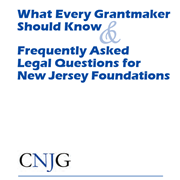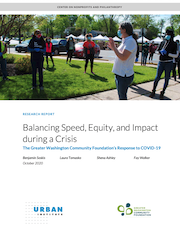Site Search
- resource provided by the Forum Network Knowledgebase.
Search Tip: Search with " " to find exact matches.
From the Commonfund, these white papers on investment policy statements, spending policy, board governance and risk tolerance, together with their most recent studies of investments at private and community foundations, operating charities and nonprofit healthcare organizations are made available though CNJG's Investment Forum for Foundations and Endowments.
Sample bylaws for Community Foundations.
A CNJG member queried our listserves for sample questions (not included in the grant application) you might ask grantees or potential grantees during site visits. CNJG compiled these responses, and other documents members use.
Community foundations are beginning to deepen and shift how they work, adopting an anchor mission that seeks to fully deploy all resources to build community wealth. Moving into territory relatively uncharted for community foundations, they are taking up impact investing and economic development — some in advanced ways, others with small steps. This report offers an overview of how 30 representative community foundations — including The Seattle Foundation, the Vermont Community Foundation, and the Greater Cincinnati Foundation — are working toward adopting this new anchor mission.
This Democracy Collaborative report was written by Marjorie Kelly, Senior Fellow and Director of Special Projects and Violeta Duncan, Community Development Associate.
This tool for unstaffed foundations includes an accountability self-assessment and a legal checklist. It is divided into nine topic sections, each of which is divided into three levels, which can help foundations tailor the tool to meet their specific interests and needs. Also included are an Excel spreadsheet to help tabulate responses, an extensive accountability resource list, and a glossary of key words and concepts used in the tool.

This guide was designed to help the state’s philanthropic community understand their ethical, legal, and fiduciary requirements and obligations.
The Ford Institute for Community Building, a program of The Ford Family Foundation, works to help community leaders learn how to implement local solutions based on principles of effective community building. This paper describes the development and work of the The Ford Institute for Community Building.
This PowerPoint presentation developed by Southeastern Council of Foundations provides an excellent overview to the pros and cons of different philanthropic structures for Corporate entities, including Corporate Foundations, Corporate Giving Programs, and working through Community Foundations.

The COVID-19 public health and economic crisis has changed our world as we know it. As employers moved to remote work, schools shifted to distance learning, and businesses closed completely, it became clear that the impact on residents, nonprofits, and businesses was far greater than anyone could have ever imagined.
In response to the growing and evolving needs of our region, the Greater Washington Community Foundation established the COVID-19 Emergency Response Fund to raise and rapidly deploy funding to local nonprofits providing food, shelter, educational supports, and other critical services.
From the beginning our goal was clear: to address the immediate needs and reach adversely affected communities, particularly low-income households and communities of color. We know all too well that in a crisis like this, these marginalized communities are hit the hardest, and often take the longest to recover.
In times of crises, The Community Foundation is our region’s philanthropic first responder, bringing together individuals and families, philanthropic peers, corporate partners, and local government advisors to address community issues. Building on our rich history of emergency response work, we grounded our COVID-19 response efforts in a similar coordinated approach.
This report chronicles the steps taken, under immense pressure, to develop a coordinated emergency response effort to support a broad range of needs across the region. Once again this effort has demonstrated that working in partnership and close collaboration with our philanthropic peers and local government advisors is an effective way to manage a response to both urgent and longer-term needs.
